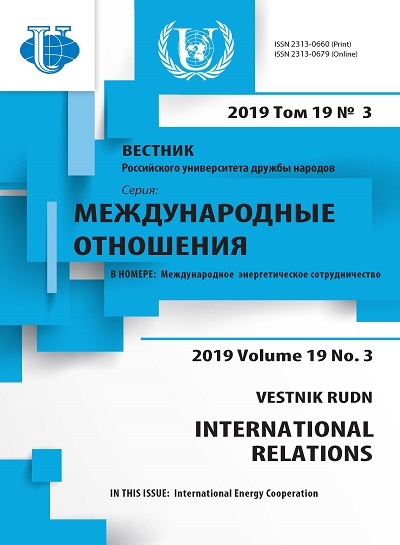Construction of Nuclear Power Plants in the Middle East with the Participation of Russian Companies in the Context of Improving the Region’s Energy Security
- 作者: Anikeev V.V.1, Bazavluk S.V.2
-
隶属关系:
- Russian Energy Agency, Ministry of Energy of the Russian Federation
- RUDN University
- 期: 卷 19, 编号 3 (2019): International Energy Cooperation
- 页面: 368-376
- 栏目: THEMATIC DOSSIER
- URL: https://journals.rudn.ru/international-relations/article/view/22587
- DOI: https://doi.org/10.22363/2313-0660-2019-19-3-368-376
- ID: 22587
如何引用文章
全文:
详细
This article examines the current state of nuclear power in the Middle East. The construction of nuclear power plants is closely related to the issues of energy security in the region. The necessity and prerequisites for diversification of the energy balance in the countries of the region, as well as the need for a reliable source of electricity, which will completely solve the problem of growing demand, are analyzed. The authors analyze the role of the Russian Federation in the development of nuclear energy in the Middle East and assess the prospects in the market of services in this sector, consider cooperation in the nuclear sector with all states of the region, identify the advantages and prospects of Russia’s possible participation in the implementation of nuclear power plant construction projects in the Middle East. The most promising direction for the development of nuclear energy today is the use of fast neutron technology and a closed cycle that allows the processing of spent nuclear fuel. The possession of such technologies has a significant potential for export and international cooperation and is a significant technological advantage of Russia. Rosatom group has competitive advantages in the market of nuclear technologies, including in the Middle East, as it has competencies in all parts of the production and technological chain of nuclear energy. The Russian Federation participates in many projects related to the construction of nuclear power plants and related infrastructure and plays a significant role in the development of nuclear energy in the Middle East, cooperates with all countries in the region that are promising for cooperation in this direction, having intergovernmental agreements, which include the construction of nuclear power plants with such States as Egypt, Jordan, Iran, UAE, Turkey, Saudi Arabia, and memorandums of cooperation with Bahrain, Qatar, Kuwait, Oman.
作者简介
Viktor Anikeev
Russian Energy Agency, Ministry of Energy of the Russian Federation
编辑信件的主要联系方式.
Email: anikeev@rosenergo.gov.ru
PhD in Technical Sciences, Head of Section of Information Support and Special Programs
Moscow, Russian FederationSergey Bazavluk
RUDN University
Email: bazavluk-sv@rudn.ru
Vice Rector for Student Affairs
Moscow, Russian Federation参考
- Albadi, A. (2012). Nuclear Energy in the Gulf Cooperation Council States. Security Index, 18 (1), 125—132. (In Russian).
- Asculai, E. (2012). Nuclear Power in the Middle East: Risks and Opportunities for Regional Security. The Nonproliferation Review, 19 (3), 391—400. doi: 10.1080/10736700.2012.734187
- Baklitsky, A.A. (2013). Nuclear Energy in the Middle East: Russia’s Interests and Role. Security Index, 2, 25—38. doi: 10.1080/19934270.2013.814942. (In Russian).
- Bocharova, L.S. (2017). Arab Countries within the World Nuclear Energy Development Trend. Vestnik of Moscow University. Series 13: Oriental Studies, 13 (4), 49—55. (In Russian).
- Borisov, M.G. (2016). Energy Development Forecast for the Asian and African Nations to 2050. Vostok. Afro-aziatskie obshchestva: istoriia i sovremennost (Vostok (Oriens)), 2, 150—160. (In Russian).
- Borisova, E.A. (2018). Development of Saudi Arabia’s Nuclear Program: Causes and Consequences. Vostok. Afro-aziatskie obshchestva: istoriia i sovremennost (Vostok (Oriens)), 4, 123—130. doi: 10.31857/s086919080000426-5 (In Russian).
- Chernenko, E.F. (2012). Power Component of Russian Policy in the Mirror of Geoeconomics. Vestnik RUDN. International Relations, 4, 57—69. (In Russian).
- Drollette, D. (2016). View from the Inside: Prince Turki al-Faisal on Saudi Arabia, Nuclear Energy and Weapons, and Middle East Politics. Bulletin of the Atomic Scientists, 72 (1), 16—24. doi: 10.1080/00963402.2016.1124655
- Koptelov, M.V. (2012). World Construction NPP Market Progress Outlook. Modern Problems of Science and Education, 4, 1—8. (In Russian).
- Kosach, G.G. & Melkumyan, E.S. (2016). Opportunities for Strategic Relations between Russia and Saudi Arabia. Russian Council on international Affairs. Working paper. URL: https://russiancouncil.ru/upload/Russia-SaudiArabia-policybrief-6-ru.pdf (accessed: 07.02.2019). (In Russian).
- Krane, J., Myers, A., & Elas, J. (2016). Nuclear Energy in the Middle East: Chimera or solution? Bulletin of the Atomic Scientists, 72 (1), 44—51. doi: 10.1080/00963402.2016.1124662
- Lorenz, T. & Kidd, J. (2010). Turkey and Multilateral Nuclear Approaches in the Middle East. The Nonproliferation Review, 17 (3), 513—530. doi: 10.1080/10736700.2010.516999
- Shaker, M. & Shihab-Eldin, A. (2015). Middle East Nuclear Cycle: Is Regionalization Possible? Security Index, 21 (1), 105—114.
- Spassky, N. (2013). Nuclear Energy as a Tool to Promote Peace and Security in the Middle East. Security Index, 19 (2), 5—8. doi: 10.1080/19934270.2013.779441
- Sukin, L. (2015). Beyond Iran: Containing Nuclear Development in the Middle East. The Nonproliferation Review, 22 (3), 379—400. doi: 10.1080/10736700.2016.1152010
- Yurtaev, V.I. (2017). Iran in Situation of the Sanction Regime Transformation. Outlines of Global Transformations: Politics, Economics, Law, 10 (2), 66—80. doi: 10.23932/2542-0240-2017-10-2-66-80 (In Russian).
- Zherlitsyna, N.A. (2015). Russia and Egypt: The Goal Is Strategic Cooperation. Asia and Africa Today, 7, 4—8. (In Russian).
- Zhiznin, S.Z. & Timokhov, V.M. (2015). Economic Aspects of the Development of Some Perspective Nuclear Technologies
- Abroad and in Russia. Vestnik MGIMO University, 4, 64—73. (In Russian).
补充文件








